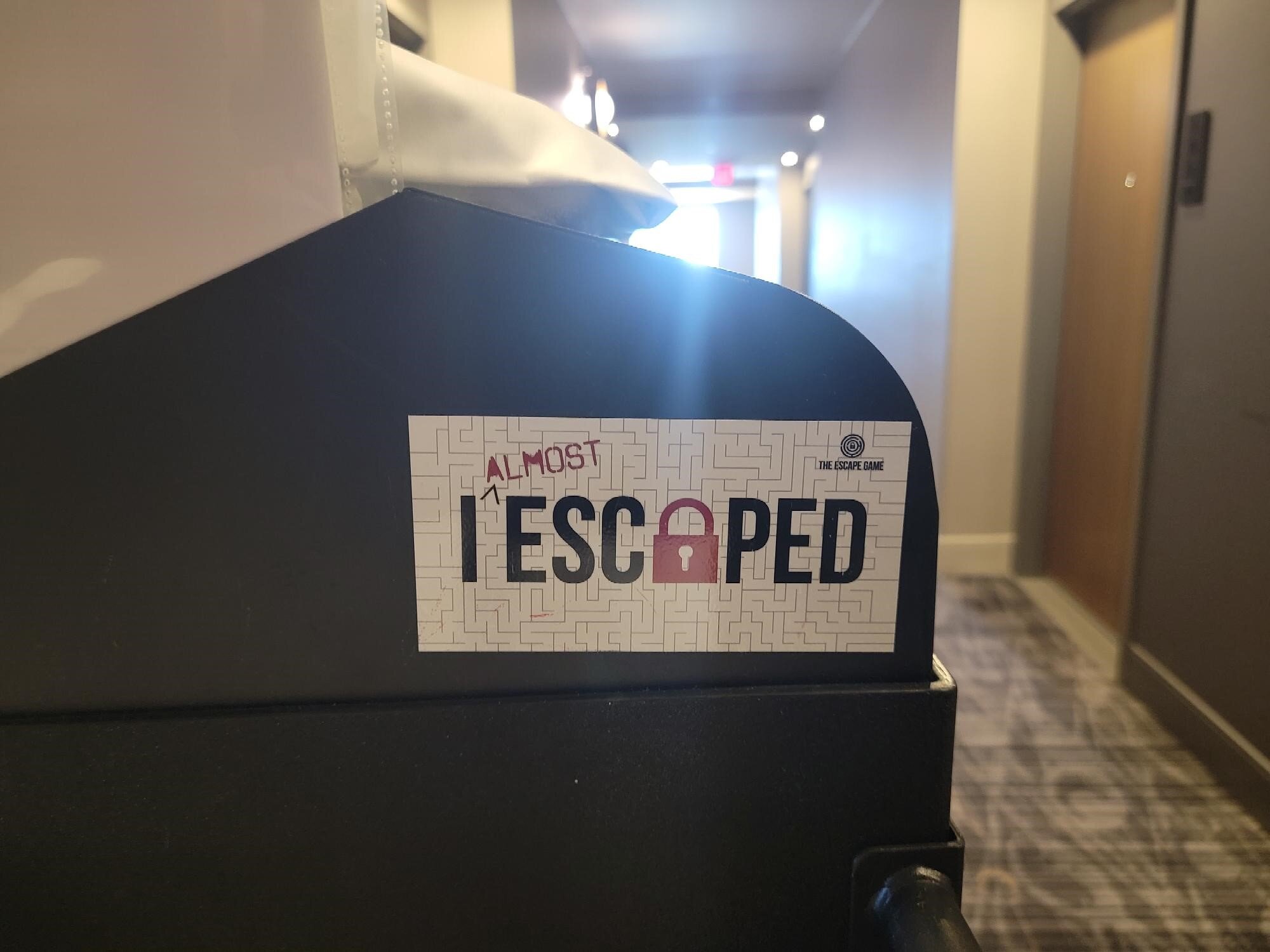The Escape Room
Ashley, my oldest, along with her husband and son, enjoys the escape room experience. She enjoys being trapped in a place and having to solve mysteries and find clues to gain her release. Clearly, my daughter has lived a life different than my own – and for that I am grateful. I sometimes feel like my entire existence has been a series of escape rooms, each of which I have escaped, however narrowly, but never unscathed.
Recently, while touring the uppermost part of the American Midwest, I saw this sticker stuck on the maid’s cart at the Hilton where we stayed”¦
“I (almost) escaped.”
That struck me. How much of life is like that? You were this close to getting away with it. You almost made it on time. The word “unscathed” popped into my head. Whenever this happens inside my brain, I tend to mull it over, to weigh it out, to see if there is anything instructive or helpful – or at least entertaining – in it.
My first thought is that the word formed by the prefix -un in order to create the opposite of its root, scathed, has gained far more use than the root ever did. When was the last time you knew of anyone being scathed?
Scathe (N)
1. To harm or injure, especially by fire.
2. To criticize or denounce severely; excoriate.
While you don’t hear the word scathe much, you will encounter – especially in places like Twitter and Facebook, where pent-up people hit the release valve on their overwrought emotions – scathing remarks.
Back to the matter at hand. When I say “unscathed” is not a word, I am overstating or misstating for effect because, clearly, it is a word and a much-used word at that. It just”¦doesn’t really have much application. It means to come through a harrowing experience unharmed or uninjured. It means to escape a predicament without consequence.
The Case of Berry Stapp
He had four names. The middle ones were Berry Stapp. Can you guess, without Googling, the first and last?
Give up?
Wyatt and Earp. Wyatt Berry Stapp Earp.
Wyatt Earp may be the most legendary name from the wild west days of American history. His story is part history, part myth, and all legend. He was an outlaw, accused of horse theft as a young man and several times arrested for connections with brothels and their employees. He was a gambler, a businessman, and the best-known lawman in the American west.
Wyatt, his brothers Virgil and Morgan, And Doc Holliday combatted the McLaurey brothers, Frank and Tom, and their partners, Billy and Ike Clanton in the Gunfight at the OK Corral in Tombstone, Arizona on October 26, 1881. Thirty bullets were fired in just thirty seconds, which is about how long the famous gunfight lasted. When the smoke cleared, Billy Clanton and the McLaureys were dead. Morgan, Virgil, and Doc were wounded. As he would in every single gun battle of his life, Wyatt came out of the battle unscathed.
Or did he?
In the days following, Virgil would lose an arm because of a bullet wound suffered during an ambush. Days later, Morgan would be killed in another attack, shot while playing billiards with Wyatt. Wyatt and Doc Holliday formed a “posse” to catch and punish the culprits. Wyatt and his boys killed Frank Stilwell, “Curly” Bill Brocius, Florentino “Indian Charlie” Cruz, and Johnny Ringo. There may have been others killed as well during this frontier justice vigilante killing spree.
Wyatt’s first real trauma in life came when, as a young man, his wife, his true love, Urilla, died while giving birth to their first child. Wyatt was devastated. The next few years, he ran on the wrong side of the law, and narrowly escaped being hanged as a horse thief in Missouri, which state he fled. He took to carousing with whores and gambling and generally misspending his time.
While some of his friends and family died premature – and some even violent – deaths. Wyatt never suffered so much as a bad cough. Nor was he ever wounded in any of his numerous gunfights. He did, however, endure the death of a brother and the dissolution of a common-law marriage due largely to his neglect, which neglect contributed to the woman’s abuse of Laudanum, an addictive drug prescribed to her by doctors. His best friend, Doc Holliday, died of Tuberculosis at the age of 29.
Wyatt lived long enough to get to know the actors who would star in movies made about him. He would particularly enjoy the friendship of early screen actor Tom Mix. He would die at the end of the Roaring Twenties and just before the Great Depression on January 13, 1929, at the ripe old age of 80. (His life actually overlapped my paternal grandfather’s by 30 years!)
Wyatt Earp lived through toxic environments, numerous careers that resulted in as much financial failure as success, deadly encounters, and vastly changing times. Some would say he came through everything unscathed.
If we could put him on the witness stand today, I believe he would tell he did not. He bore in his soul the pain of the losses he endured, the loved ones he lost. He was not, by any means, unscathed.
You can even hear it in his own words”¦
“Destiny is that which we are drawn towards and Fate is that which we run into.”
The Deal with Fate
“Don’t tempt fate.”
This is how we put it when we warn someone against foolish or reckless behavior,
Jesus put it another way. He said, “Do not tempt (or test) the Lord God.”
Life is a never-ending cycle of sowing and reaping. We are always sowing and we are always reaping. None of us is unscathed. The best we can do is to do our best to mitigate the damage associated with living in a sin-cursed, trouble-soaked world. The best way to do that is to do the right thing when you know what the right thing is to do.
The Trouble with Decisions
What about when you run into the inevitable decision that has no clear-cut do or don’t, like whether to change jobs, when or if to get married, or which milk to buy at the grocery store? That is when experience and education (life is education) come to bear. Use the knowledge and insight you have gained to make the best decision you can and live with the outcome, even if you don’t come out unscathed.
When I married, I was not yet out of my teens. Months before the marriage, I was in need of work and went to an industrial park on the east side of Arlington, Texas, and went door-to-door, looking for work. The second place I came to was Sonoco Paper Products. They manufactured paper tubes of all descriptions, from toilet roll and Scotch tape cores to forms for concrete pillars. They hired me on the spot. Six weeks later, the plant manager called me into his office, told me he saw great things in me and made me the youngest-ever manager in the nationwide company. Months after we were married and while Donya was pregnant with our first child, I felt the tug at my soul to ministry, to which I had “surrendered” as a boy.
I quit Sonoco, but not before one of my best friends there, an older black man and forklift driver, George gave me one of my favorite and most often used quotes. He said to me, almost every day, “Preacher, what the Good Man do, he do for the better.”
God bless you, George, wherever you are.
The plan was to move to Georgia to attend Seminary. Life got in the way, however, when Donya underwent surgery to have a cancerous ovary removed and we never left for Georgia. Instead, I was compelled to find another job, this time at the Western Paper Company. Shortly thereafter, I was recommended by my mentor and then-president of Trinity Valley Baptist Seminary, Dr. Ted Hicks, to a church in Haltom City, Texas, to serve as youth pastor. Though I was yet a youth myself, I was hired. This began a long and winding road through Missouri to attend bible college, back to Texas for my second daughter’s first surgery (she was born with Spina Bifida), to Porterville, California to serve as Principal of a Christian School and Youth Minister, to Turlock, California to assume my first senior pastorate at age 23.
In 1991, we returned to Texas shortly after my father’s untimely death. I assumed a pastorate in Paris, Texas, then merged two congregations and remained there until 1996. The next four years, I call “the lost years.” At one point, I found myself driving a cab and delivering pizzas, working 18 hours per day, and still not able to make the ends meet or the middle make sense.
In 2000, I became a school teacher and thought I would retire as one.
In 2005, Katrina hit New Orleans and the Mississippi coast and I found myself doing something I had no clue about. I was a catastrophe adjuster. I have ridden the highs and lows of the storm season pretty much ever since, with the three-year exception when, while the storms were quiet a bit too long, I entered the business of single-occupancy rentals, working for Tricon Residential, managing the rehab and maintenance teams who took care of 2,500 properties in Texas.
Now, here I am, pounding away on this keyboard because along the way I discovered writing, which has been its own adventure, and maybe I will share that soon enough. I am sitting here, intermittently typing out my thoughts and looking out the window into the serenity of my backyard, where a Cardinal flitters down to the pool for a sip and then back to the ledge of the waterfall, retracing my steps and realizing”¦
This is the 40th anniversary of my decision to leave Sonoco.
Had I stayed at the company where my star had begun to rise so quickly, how different would my life look today? Would I have become a plant manager, a vice president, president”¦? Would I be retired and living the RV life?
Unscathed is not a word; Undefeated is.
I have lived my life in fits and starts, uphill climbs, and hairpin curves. I have made devastatingly bad decisions and a few that “worked out.” I have had the stuffing kicked out of me until I literally lay on the floor unable to move, paralyzed by fear and regret. And I have learned there is no such word as unscathed. Well, there is, it just has no application in the real world. Every word and deed, every decision, every encounter, every mile makes its mark and takes its toll, my friend, and none of us are getting out of this thing alive.
None of us will be unscathed.
I read somewhere the other day and wish I had written it down or could remember where I saw it, but it was something like this: “You cannot threaten with failure the person who is unafraid to start over because he’s done it before and he knows he is good at it.”
Take it from me. If you won’t take it from me, take it from Wyatt Earp”¦
You will not be unscathed, but as long as you keep getting back up, as long as you learn from your past and are not afraid to begin again, you will be undefeated.
“He gives power to the faint
and increases the strength of the weak.Even youths grow tired and weary,
and young men stumble and fall.But those who wait upon the LORD will renew their strength; they will mount up with wings like eagles;
they will run and not grow weary, they will walk and not faint.”




